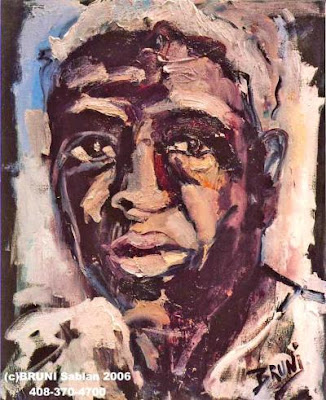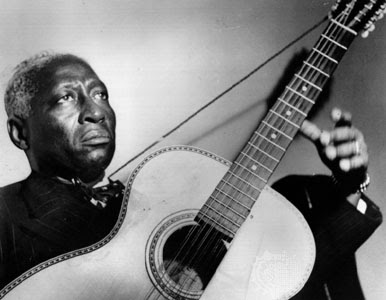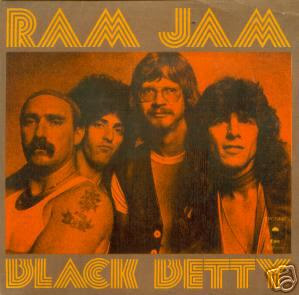 "Black
Betty" is a 20th century African-American work song often credited to
Huddie "Lead Belly" Ledbetter as the author, though the earliest
recordings are not by him. Some sources claim it is one of Lead Belly's
many adaptations of earlier folk material; in this case an 18th century
marching cadence about a flint-lock rifle.
"Black
Betty" is a 20th century African-American work song often credited to
Huddie "Lead Belly" Ledbetter as the author, though the earliest
recordings are not by him. Some sources claim it is one of Lead Belly's
many adaptations of earlier folk material; in this case an 18th century
marching cadence about a flint-lock rifle. 

The Lomaxes were recording for the Library of Congress and later field
recordings in 1934, 1936 and 1939 also include versions of "Black
Betty". It was recorded commercially in New York in 1939 by blues artist
Lead Belly, as part of a medley with two other work songs: "Looky Looky
Yonder" and "Yellow Woman's Doorbells". Lead Belly had a long
association with the Lomaxes, and had himself served time in State
prison farms.


In 2006 the University of New Hampshire administration controversially
banned the playing of Ram Jam's Black Betty at UNH Hockey games. UNH
Athletic Director Marty Scarano explained the reason for the decision:
"UNH is not going to stand for something that insults any segment of
society".

In Lead Belly's version of the song, Black Betty is characterized as a woman with a child:
Woah, Black Betty
bam-ba-lam
Woah, Black Betty
bam-ba-lam
Black Betty had a baby
bam-ba-lam
Black Betty had a baby
bam-ba-lam
Damn thing gone crazy
bam-ba-lam
Damn thing gone crazy
bam-ba-lam
 In
an interview (see The Land Where the Blues Began, 1st Edition, Alan
Lomax, Pantheon Books, 1993) conducted by Alan Lomax with a former
prisoner of the Texas penal farm named Doc Reese (aka "Big Head"), Reese
stated that the term "Black Betty" was used by prisoners to refer to
the "Black Maria" -- the penetentiary transfer wagon. Below is a song in
which the term "Black Betty", used to refer to the wagon, appears in
the context of a prison work song.
In
an interview (see The Land Where the Blues Began, 1st Edition, Alan
Lomax, Pantheon Books, 1993) conducted by Alan Lomax with a former
prisoner of the Texas penal farm named Doc Reese (aka "Big Head"), Reese
stated that the term "Black Betty" was used by prisoners to refer to
the "Black Maria" -- the penetentiary transfer wagon. Below is a song in
which the term "Black Betty", used to refer to the wagon, appears in
the context of a prison work song.
Black Betty's in the bottom,
I can hear her roar,
She's bringing some po sucker,
With an achin soul.
She'll bring you here and leave you,
Let your hammer ring,
For a hundred summers,
Let your hammer ring.
(and now we hear the most familiar part of the song)
Black Betty's got a baby,
Let your hammer ring,
Damn thing's gone crazy,
Let your hammer ring,
Dipped its head in gravy,
Let your hammer ring.
 In
this interpretation, Black Betty's baby may be the prisoner himself,
who has by his own admission "gone crazy" -- seeing as it was "Black
Betty" who delivered the prisoners into the prison world ("She's
bringing some po sucker"). In the lyrics above, the phrase "Let your
hammer ring" is used repeatedly. In this case, the "hammer" refers to
the hoes used by prisoners to break up the ground in the cotton fields.
The song itself was used to keep a steady rhythm among the workers as
they toiled in the field. It had the added benefit of helping the time
go by faster through collective participation.
In
this interpretation, Black Betty's baby may be the prisoner himself,
who has by his own admission "gone crazy" -- seeing as it was "Black
Betty" who delivered the prisoners into the prison world ("She's
bringing some po sucker"). In the lyrics above, the phrase "Let your
hammer ring" is used repeatedly. In this case, the "hammer" refers to
the hoes used by prisoners to break up the ground in the cotton fields.
The song itself was used to keep a steady rhythm among the workers as
they toiled in the field. It had the added benefit of helping the time
go by faster through collective participation.
Many early blues and proto-blues songs follow the theme that all the
wickedness of man (Adam) is the result of a woman (Eve). A number of
early artists sang of how they got mixed up with a woman and ended up in
prison as a result. As such, the characterization of the prison wagon
as a woman is not unprecedented.

* New Japan professional wrestler Togi Makabe uses the Ram Jam version
as his entrance music, as does American independent professional
wrestler Adam Pearce.
* Boston Red Sox pitcher Mike Timlin uses the song when he comes out of the bullpen at home games.
* Texas Rangers' second baseman Ian Kinsler uses this song as his intro music when he comes up to bat.
* During his NHL career, Cam Neely reportedly would listen to this song
once before every game as part of a supersitious ritual.
* Chicago White Sox' first baseman-outfielder Darin Erstad uses this song as his intro music when he comes up to bat.
* ABN Amro used the name Black Betty for their main boat which won the Volvo Ocean Race 05/06.
* The Kansas City Chiefs play "Black Betty" before every kick at home games at Arrowhead Stadium at the Truman Sports Complex.

No comments:
Post a Comment